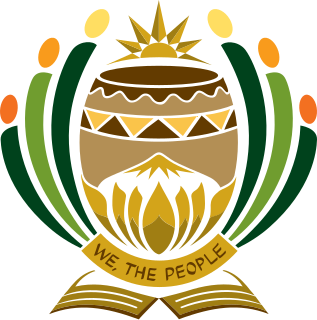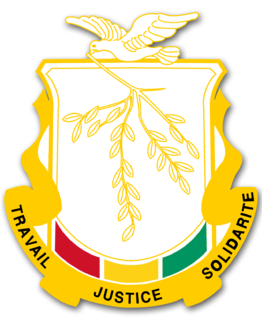
The Parliament of South Africa is South Africa's legislature and under the country's current Constitution is composed of the National Assembly and the National Council of Provinces.

Elections in Benin take place within the framework of a multi-party democracy and a presidential system. Both the President and the National Assembly are directly elected by voters, with elections organised by the Autonomous National Electoral Commission (CENA).

Elections in Guinea-Bissau take place within the framework of a multi-party democracy and a semi-presidential system. Both the President and the National People's Assembly are directly elected by voters.

Elections in Rwanda take place within the framework of a multi-party democracy and a presidential system. The President and majority of members of the Chamber of Deputies are directly elected, whilst the Senate is indirectly elected and partly appointed.
Adrien Houngbédji is a Beninese politician and the leader of the Democratic Renewal Party, one of Benin's main political parties. He was President of the National Assembly of Benin from 1991 to 1995, Prime Minister of Benin from 1996 to 1998, and President of the National Assembly again from 1999 to 2003. Beginning in 1991, he stood repeatedly as a presidential candidate; he placed second in 2006, but was heavily defeated by Yayi Boni in a second round of voting. Since 2015, he has served for a third time as President of the National Assembly.

The unicameral National Assembly is Benin's legislative body.

Parliamentary elections were held in Benin on 17 February 1991, the first multi-party elections in the country since 1964. The Union for the Triumph of Democratic Renewal alliance emerged as the largest faction, with 12 of the 64 seats in the National Assembly. Voter turnout was 51.7%.

Parliamentary elections were held in Benin on 28 March 1995, although voting for thirteen seats was re-run on 28 May after the Supreme Court invalidated the results due to irregularities. The Democratic Renewal Party emerged as the largest party in the National Assembly, winning 19 of the 83 seats. Voter turnout was 75.8%.

Elections for the National Revolutionary Assembly were held in Benin on 20 November 1979. At the time, the country was a one-party state under the People's Revolutionary Party of Benin, with voters given the choice of approving the party's list of 336 candidates or not. The list was ultimately approved by 98.3% of voters, with an 80.6% turnout. Following the election, Mathieu Kérékou was elected President (unopposed) by the Assembly on 6 February 1980.

Elections for the National Revolutionary Assembly were held in Benin on 10 June 1984. They were originally scheduled for 1983, but the term of the Assembly was extended by 18 months. At the time, the country was a one-party state under the People's Revolutionary Party of Benin, with voters given the choice of approving the party's list of 196 candidates or not. The list was ultimately approved by 98.2% of voters, with a 93.1% turnout. Following the election, Mathieu Kérékou was elected President (unopposed) by the Assembly on 31 July.
Benin, officially the Republic of Benin, is a country in Western Africa. It borders Togo to the west, Nigeria to the east and Burkina Faso and Niger to the north; its short coastline to the south leads to the Bight of Benin. Its size is just over 110000 km2 with a population of almost 8500000. Its capital is the Yoruba founded city of Porto Novo, but the seat of government is the Fon city of Cotonou. About half the population live below the international poverty line of US$1.25 per day.

General elections were held in Zambia on 26 October 1988. At the time, the country was a one-party state with the United National Independence Party (UNIP) as the sole legal party. UNIP leader Kenneth Kaunda was automatically re-elected for a sixth five-year term as President with 95.5% of the vote, whilst UNIP also won all 125 seats in the National Assembly. Voter turnout was around 60% in the parliamentary election, but 58.8% in the presidential election.

Parliamentary elections were held in Somalia on 30 December 1979.

General elections were held in Djibouti on 24 April 1987 to elect a President and National Assembly. In the presidential election the only candidate was incumbent Hassan Gouled Aptidon of the People's Rally for Progress, the country's sole legal party. He was re-elected with 99.23% of the vote. In the National Assembly elections the RPP put forward a list of 65 candidates for the 65 seats, which was approved by 98.6% of voters with a turnout of 88.69%.

Parliamentary elections were held in Djibouti on 21 May 1982. They were first elections for the National Assembly since independence in 1977, and were open only to the People's Rally for Progress, which had become the country's sole legal party the previous year. The RPP put forward a list of 65 candidates for the 65 seats, which was approved by 100% of voters with a turnout of 92.4%.

General elections were held in Togo on 30 December 1979, alongside a constitutional referendum that confirmed the country's status as a one-party state. Gnassingbé Eyadéma, who had led a coup in 1967, was elected President unopposed, whilst the Rally of the Togolese People won all 67 seats in the National Assembly as its list of 67 candidates was approved by voters. Voter turnout was reported to be 99.3% in the parliamentary election and 99.4% in the presidential election.

Parliamentary elections were held in Mali in 1964. Voters were presented with a single list from the Sudanese Union – African Democratic Rally (US-RDA), which had been the sole legal party since shortly after independence in 1960. As a result, it won all 80 seats in the National Assembly. According to official results, 99 percent of those who voted approved the US-RDA list. Voter turnout was 88.9%.

General elections were held in Guinea on 1 January 1968 to elect a President and National Assembly. The country was a one-party state at the time, with the Democratic Party of Guinea – African Democratic Rally as the sole legal party. Its leader Ahmed Sékou Touré was re-elected President unopposed, whilst in the National Assembly elections the party produced a list of 75 candidates for the 75 seats, which voters were asked to approve. Voter turnout was 99.7%.

Parliamentary elections were held in Cape Verde in June 1975 in preparation for independence from Portugal on 5 July. The African Party for the Independence of Guinea and Cape Verde was the sole legal party at the time, with voters being asked to approve or reject a PAIGC list of 56 members for the National People's Assembly. Its party leader was Aristides Pereira. The list was approved by 95.6% of voters, with a turnout of 86.7%.
Early parliamentary elections were held in Egypt on 6 April 1987, with a second round for nine seats on 13 April. They followed a change in the electoral law, approved by a referendum in February, which would allow independent candidates to run in the election. The result was a victory for the ruling National Democratic Party, which won 346 of the 458 seats. Following the election, the People's Assembly nominated incumbent Hosni Mubarak for the post of president, whose candidacy was put to voters in a referendum on 5 October.















